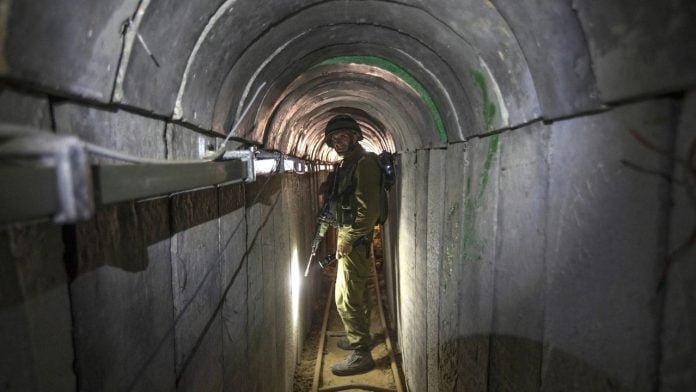The Gaza Strip, a small piece of land on the eastern coast of the Mediterranean Sea, has been a focal point of conflict and hardship for decades. Amidst the turmoil and challenges faced by the Palestinian population in this region, a unique and controversial infrastructure – the Gaza tunnels, has caught the attention of many in recent times. These subterranean passages, with their complex history, have become an essential part of life for many Palestinians, enabling their survival under difficult circumstances. We, at True to Life, are now going to take a closer look at all the important things you need to know about these tunnels.
History of the Gaza Tunnels:
The history of the Gaza tunnels dates back to the early 1980s according to multiple sources. During this time, the Gaza Strip was under Israeli control, and the tunnels offered a means to bypass Israeli restrictions and the blockade of goods. These tunnels mainly served economic purposes, allowing Gazans access to essential goods that were otherwise hard to obtain.
However, the significance and use of these tunnels took a serious turn in 2007 when Hamas, the Palestinian political and military organization, took control of the Gaza Strip. In response to the Israeli blockade and restrictions on imports, Hamas began expanding the tunnel network for a variety of reasons, including smuggling weapons and essential supplies.
The Gaza tunnels, also known as Gaza Metro or cross-border tunnels, are an extensive network of underground passages running beneath the border between the Gaza Strip and Egypt. These tunnels vary in length and depth, with some extending for several kilometres. Estimates suggest that there are hundreds of these tunnels, serving as crucial conduits for goods, people, and weapons.
According to a report on The Quint, this secret tunnel labyrinth has about 1,300 tunnels. The same report suggests that Hamas claimed that the complete length of these tunnels can be over 500 KM.
What the Tunnels are Believed to be Used For?
Surviving Bombardment: The tunnels provide a crucial lifeline for Hamas fighters during intense bombardments like now. These hidden passages act as shelters, allowing them to evade the relentless Israeli airstrikes.
Moving Around Gaza: The tunnels also facilitate movement for Hamas fighters across Gaza without exposing themselves to the watchful eyes of the Israeli military. This mobility helps them operate effectively and avoid detection.
Resupplying Forces: Vital supplies, including weapons, ammunition, and medical equipment, are transported through the tunnels. This clandestine resupply mechanism ensures that Hamas remains well-equipped to continue their resistance.
Hiding Hostages: The IDF believes that these tunnels are also being used to hide the hostages during the ongoing war. This is mainly because of a statement made by a hostage, Yocheved Lifshitz, an 85-year-old Israeli woman, when she was released from the Hamas group. She described the tunnels as a “spider’s web” and said that the “tunnels stretched for kilometres beneath Gaza.
Conducting Surprise Attacks: These hidden passages may also allow Hamas to mount surprise attacks on Israeli forces, often emerging from unexpected locations. These ambushes keep the Israeli military on edge.
Command-and-Control Centers: Some tunnels are said to serve as command-and-control centres, facilitating communication and coordination of Hamas forces.
Why are Gaza Tunnels the focal point for the IDF?
The tunnels, according to the IDF, serve as a strategic asset for Hamas in their war with Israel. Here are some reasons why they are so important to the IDF:
Safe and Covert Movement: The IDF believes that the Hamas fighters can move between fighting positions safely and discreetly using the tunnels. This allows them to outmanoeuvre the IDF and launch attacks from unexpected locations.
Surviving Bombardment: The IDF also believes that the tunnels also provide protection against Israeli airstrikes, allowing Hamas fighters to endure relentless bombardment without suffering casualties.
Covered Mobility: The tunnels can also enable Hamas to move around Gaza under cover, making it difficult for the IDF to track and target their movements.
Resupply and Reinforcement: Vital supplies, including weapons and ammunition, can be transported through the tunnels, ensuring a constant flow of resources to Hamas fighters, according to the IDF.
According to a Reuters report, Israeli officials have confirmed that locating and disabling this extensive tunnel network is a daunting task for the IDF. They have emphasized that this is a fundamental part of their offensive strategy in Gaza, but it is expected to be a time-consuming endeavour. Given the complexity of the tunnels and the need to ensure that they are thoroughly neutralized, they believe this phase of the operation is likely to take an extended period.
Avi Melamed, a former Israeli intelligence official and negotiator during past conflicts, highlighted that the IDF’s plan is multi-faceted, involving the location of tunnels, destruction of rocket launch sites, and targeting of Hamas leaders and fighters. This comprehensive approach is aimed at disrupting the military infrastructure that supports Hamas.
Escalating Humanitarian Concerns:
As the conflict rages on, the humanitarian toll in Gaza has been devastating. Palestinian health officials report over 10,000 casualties, including many civilian casualties, amplifying international calls for a ceasefire. Millions of people worldwide have been protesting and demanding an end to the bombings and the loss of innocent lives.
Diplomatic pressure on Israel to implement a humanitarian ceasefire has been mounting. However, the Israeli government has thus far resisted these calls, asserting that a ceasefire is not imminent.
Also read: A Closer Look at the Humanitarian Crisis in Gaza
Sources: Al Jazeera, The Indian Express, The Quint, The Guardian, Reuters
By: Ashbiha Fathima reporting from Chennai for True to Life.
